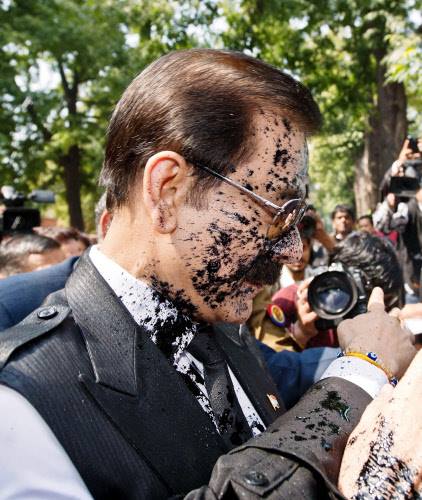New Delhi, Mar 4: The Supreme Court on Tuesday said that it was totally unhappy with Sahara chief Subrata Roy's proposal to refund money to investors.
The apex court said it will send him to custody in Delhi till he comes up with a concrete proposal.
Earlier, Sahara chief Subrata Roy on Tuesday assured the Supreme Court that its order will be followed by him and sought more time for refunding money to investors.
Subrata Roy said that Sahara will sell its assets to pay up the Rs 22,500 crore it owes investors. The sale of properties can start from tomorrow onwards.
Personally arguing his case, Subrata Roy said that while the sale of of assets is on, the company will try to give bank guarantee for rest of the amount which is due to investors.
Subrata Roy added that he wanted one more chance to honour the court order and said that if he failed in this last endeavour, he would come back to stand before the court and accept punishment.
Reacting to this, the SC bench asked why payments were not done for the last one-and-a-half years and why Sahara was giving one excuse after the other.
The Supreme Court said that sale of assets of Sahara group is the responsibility of the company and the apex court would have no role to play except strictly ensuring compliance of its orders.
Subrata Roy also personally tendered an apology for his absence in the Supreme Court on February 26, saying reasons for his absence were very genuine.
"I am sorry for my absence," Subrata Roy said.
The SC bench accepted the apology of the Sahara chief.
'Lawyer' throws ink at Sahara chief Subrata Roy, calls him a thief
A lawyer threw ink at Subrata Roy outside the Supreme Court premises.
Manoj Sharma, who claimed to be an advocate from Gwalior, threw ink at Roy as the latter got out of a car and was heading towards the court amid security personnel and a large number of mediapersons.
"I threw ink at Subrata Roy as he is a thief and has robbed the poor," Sharma shouted, after which he was hurriedly taken away by police.
Roy was brought to Delhi on Monday after he was arrested by the Lucknow police on February 28.
The apex court on February 26 had issued a non-bailable arrest warrant against Roy for failing to appear before it in person as directed by the court.






Comments
Add new comment